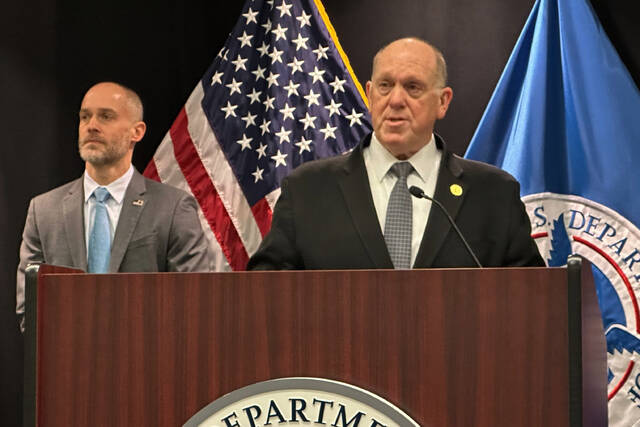WASHINGTON — Senate Republicans on Wednesday unilaterally changed the rules governing presidential nominations, a bitter escalation of the long-running dispute over the rights of the minority in a chamber once hailed for its bipartisan nature.
The move, on a largely party-line vote of 51 to 48, will ease the confirmation process for President Trump’s nominees to sub-Cabinet positions in federal agencies. The Senate is poised to make the same change later in the day to speed judicial nominees at the district court level.
The move exposed raw emotions delivered in highly personal terms between the two sides, particularly an angry exchange between Senate Majority Leader Mitch McConnell, R-Ky., and Minority Leader Charles Schumer, D-N.Y.
“He started this whole thing,” McConnell said just before the final vote, glaring at Schumer and blaming him for a decision 18 years ago that was one of many steps toward Wednesday’s actions.
Moments earlier, Schumer accused the GOP leader of wanting to turn the Senate into a “conveyor belt” to approve Trump’s nominees and admonished Republicans for allowing McConnell’s “debasement of the Senate.”
Under previous Senate orders, these nominees used to require 30 hours of debate after they had cleared an initial procedural vote. Now, such nominees will receive just two hours of formal debate before a final confirmation roll call.
In changing the rules, Republicans accused Democrats of trying to block the formation of Trump’s administration and the federal judiciary by dragging out the confirmation of noncontroversial nominees merely to create procedural gridlock.
Democrats countered that Trump, in conjunction with McConnell, has jammed the Senate with a set of historically unqualified nominees and broke with traditions of previous administrations, of both parties, in consulting with senators from the other party on many appointments.
The final steps played out in a heated debate before the first set of several procedural votes set to occur into Wednesday evening. The parliamentary move was once deemed so controversial that senators call it the “nuclear option,” a violation of long-standing requirements that rules changes had to be approved by a two-thirds majority.
“When history is written, this is all going to look like a tragic farce,” Sen. Michael Bennet, D-Colo., said in the final minutes of debate, imploring Republicans to back away from such a hyperpartisan action.
Sen. Tom Cotton, R-Ark., followed with a brief history of the nomination battles dating to the early days of the President George W. Bush administration, beginning with Schumer, then a first-term senator, crafting a plan to block Bush’s judicial nominees.
“Today, Senator Schumer will reap what he sowed,” Cotton said.
Democrats have long complained about Cotton’s obstruction during President Barack Obama’s second term, including his refusal to allow a vote on the nomination of Cassandra Butts, a friend of the president, to be ambassador to the Bahamas for two years. She died while waiting for Senate confirmation.
The new rules will allow McConnell to rapidly confirm nominees to U.S. district courts, two steps below the Supreme Court, and to positions such as the assistant secretary of the Commerce Department - which was the post that triggered Wednesday’s fight and rules change.
McConnell has said shifting the federal judiciary to the right is his single biggest priority as Senate leader, a process that he began with great controversy by refusing to consider any nominee to replace Justice Antonin Scalia on the Supreme Court after his February 2016 death.
McConnell refused to give nominee Merrick Garland a hearing in the last year of Obama’s term, keeping the seat vacant for the next president to fill.
A year later, after Trump’s victory, Senate Republicans faced a filibuster of Neil Gorsuch’s nomination to fill the Scalia vacancy and executed a party-line change of rules to lower the threshold for all judicial nominees to a simple majority. Republicans cited the Democratic use of the “nuclear option” in 2013 when they lowered the filibuster hurdle for every other nominee.
The two actions, taken together, effectively left the minority party with almost no power to block presidential appointments, so long as the majority was unified in support. The last line of defense became using up every bit of time that was afforded to the minority, to try to slow the majority’s pace.
Republicans, in late 2013, began to drag out every last hour of Obama’s nominees, until they won the majority in the 2014 midterms and for the final two years of Obama’s administration ground the confirmation process to a virtual halt.
That left more than 100 vacancies for the lifetime appointments on federal courts at the start of Trump’s presidency. McConnell took full advantage of that opportunity and set a record pace for confirming judges to the circuit courts of appeal, the powerful benches one rung below the Supreme Court.
Democrats charged McConnell with hypocrisy as he, Trump and other Republicans boasted about the fast pace of confirming judicial nominees while complaining about obstruction by Democrats.
“My colleagues on the other side can’t have it both ways,” Sen. Ron Wyden, D-Ore., said.
Sen. James Lankford, R-Okla., who took a lead role in drafting the new proposal, said he has tried to get a bipartisan deal that would have changed the rules under the normal procedure, hoping that Democrats would want a potential president of their party to benefit from the faster confirmation process.
Democrats, however, were willing to vote for such a proposal only if it did not take effect until after the 2020 election, a move Republicans rejected.
“I’ve been rebuffed for two years, not a single Democrat has been willing to join us,” Lankford said.
Schumer said Republicans would regret the move.
“To do this for such blatantly political ends is simply unworthy of this institution,” he said.








